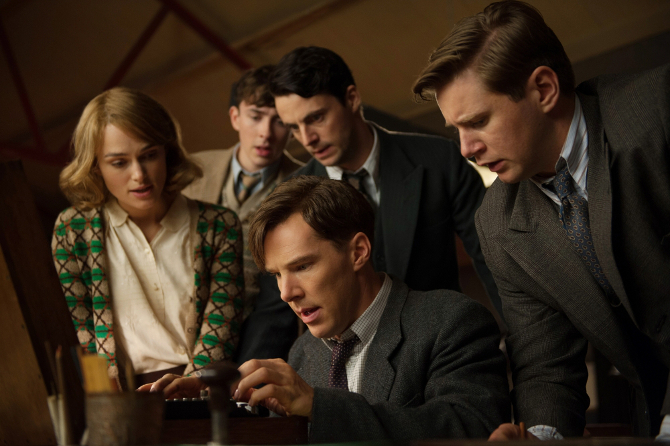This article is more than 1 year old
Benedict Cumberbatch in The Imitation Game: Glimpses of Turing's life, but that's all ...
A life lived in secret in more ways than one
Hollywood gloss leads to gay abandon
The pair never come across as anything more than great friends, with a lot of affection between them, but certainly no romantic inclinations and the scene in which Turing comes out to Joan is hugely moving. Joan offers to go ahead with the marriage because to do so would give them both access to things that they want in life – for her, the opportunity to continue working despite her gender and for him, legitimacy and friendship – as well as being able to talk as they do and keep each other company, and when he refuses the offer, she’s genuinely hurt.
His refusal is as much about her as it is about himself as he struggles to make the right decision for both of them and her unhappiness at the broken engagement clearly devastates him. Whether any of this is strictly true or accurate is conjecture, but their difficulties in keeping to the roles society has placed them in and the compassion and affection this gives them for each other seems very real and both actors make you feel it keenly.
However, it hits something of a dud note that this is the main relationship of Turing's that the film focuses on. In fact, for a film that’s as much about his homosexuality as it is about his code-breaking, we never once see Turing with a man at all. Instead, we see flashbacks to Turing’s friendship at school with Christopher Morcom and how that blossomed into a schoolboy crush that is miserably dashed before it can go anywhere when Morcom dies of bovine tuberculosis complications as a child.
The entire film is framed by the police investigation that uncovers his homosexuality, but we never once see Turing enjoying that part of his life, in love or happy. His homosexuality, whether intentionally or not, is constantly portrayed as a problem in his life, a difficulty that needs to be overcome and making it so unrelentingly negative has the unfortunate feel of a judgement on his sexuality, rather than a judgement on the ignorance and bigotry of the times.
Turing’s well-documented eccentricities are also handled somewhat problematically. While he was known to have the sort of idiosyncrasies that might nowadays lead to a diagnosis of Asperger’s syndrome or perhaps obsessive-compulsive disorder, they may equally have just been eccentricities. The Turing played by Cumberbatch approaches autistic levels of inability to interact with others and with the current trend for this type of mental illness to be portrayed in films and on TV, and particularly linked with genius, this occasionally feels like another exaggeration of the facts for effect.

The decryption gang in The Imitation Game. Credit: Studio Canal/Weinstein Company
Finally, we come to Turing’s death from cyanide poisoning, ruled a suicide at the time, but questioned since then. As Turing was known to experiment with chemicals in the closed confines of his rooms, it is certainly possible that the cyanide poisoning was accidental and historians, family members and others have all suggested that possibility. The film presents an unequivocal suicide by first making it appear that Turing was devastated by the effects of the chemical castration he was forced to undergo after his conviction for homosexuality and then stating in black and white at the end in a written synopsis that he “committed suicide”.
It doesn’t mention that at the time of his death in 1954, he was no longer on the hormone treatment, nor that the apple suggested as the vehicle for the poison was never tested for cyanide, as those who argue with the suicide ruling point out. Here is an aspect of Turing's life with tremendous dramatic weight that remains unexplored by the film-makers.
Although this is a great film in many ways, evocative of the period, with excellent performances from the cast and great pace, Turing's tale feels unfinished. The Imitation Game is partly a film about the hidden humanity of genius, like A Beautiful Mind, partly a classic war movie about morality and tough choices and partly a film about the historical mistreatment of homosexuality, like Milk. All three themes are deftly woven together, but by going for all three, the film ends up with an overview of Turing's life rather than a snapshot of the man himself. Perhaps this was unavoidable in a movie about a man who lived so much of his life in secret. ®
The Imitation Game trailer
Check out The Register's interviews with The Imitation Game's director, writer and some of the film's cast.
 Writer Graham Moore
Writer Graham Moore
Director Morten Tyldum
Title The Imitation Game
Cast Benedict Cumberbatch, Keira Knightley, Matthew Goode, Allen Leech, Matthew Beard, Mark Strong, Rory Kinnear
Release date 14 November (UK) / 12 November (US)
More info Official website
